Moves 18
Combined ARMS: Additional Scenarios and Unit Values
by Kip Allen
This is an official addition to SPI's Combined Arms game. Players may
wish to remove it from this magazine by opening the staples and pulling
out these center four pages.
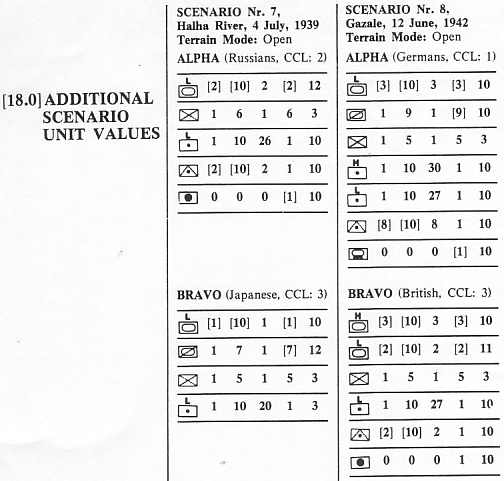
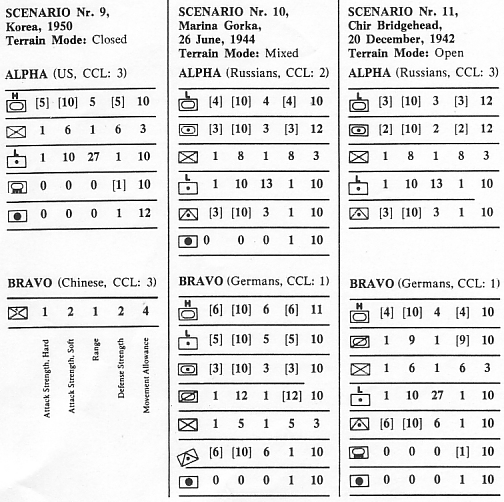
[18.1] SCENARIO Nr 7, HALHA RIVER, 4 July, 1939
TERRAIN MODE: OPEN
FORCES:
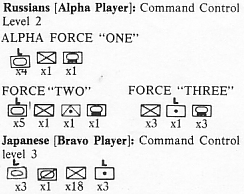
DEPLOYMENT: Japanese set up first; Russians move first.
Russians (Alpha Player): Force "One" enters on hex #4701 on Game-Turn 1,
Force "Two" enters on hex #3701 on Game-Turn 3, Force "Three" enters on
hex #6103 on Game-Turn 5.
Japanese (Bravo Player): Set up within five hexes of hex #3831.
GAME LENGTH: 14 Game-Turns
VICTORY CONDITIONS: Japanese win if they have four or more undisrupted
units on the east side of the 4501-5221 river and north of the 5222-6122
hex line, inclusive. If there are between one and three Japanese units
that fulfill these conditions, the game is a draw. If there are no
undisrupted Japanese units that fulfill these conditions, the game is a
Russian victory.
SPECIAL RULES: All Russian infantry enter the game mounted in APC's.
HISTORICAL NOTES: The battle of Halha River, sometimes called the
Nomohan Incident or Khalkhin-Gol Affair, occurred during the undeclared
war between Russia and Japan in Mongolia during 1939. Elements of the
Japanese 23rd Division had been badly mauled by Soviet forces for the
preceding three days. The Japanese forces attempted to retire across the
Halha River during 4 July, 1939. Russian forces, including Ilth Tank
Brigade, 7th Mechanized Brigade and the 24th Motorized Rifle Regiment,
attempted to intercept the Japanese force and destroy it.
In extremely heavy fighting, the remnants of the Japanese 23rd Division
succeeded in withdrawing behind the Halha River. Casualties were heavy
on both sides. Although the 23rd Division was saved from destruction,
losses in Japanese armor were so high that the Japanese never again
committed armor against the Russians in their undeclared war.
[18.2] SCENARIO Nr. 8, GAZALA, 12 June, 1942
TERRAIN MODE: OPEN
FORCES:
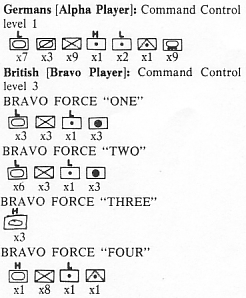
DEPLOYMENT: British deploy first; Germans move first.
Germans (Alpha Player): Enter on Game-Turn 1 on any hex(es) ending in 33
or 34.
British (Bravo Player): Force "One" deploys within two hexes of hex
#2133; Force "Two" deploys within two hexes of hex #3323; Force "Three"
deploys within two hexes of hex #4523; Force "Four" deploys within four
hexes of hex #6014.
GAME LENGTH: 8 Game-Turns.
VICTORY CONDITIONS: The Player who destroys the higher number of Enemy
combat units at the end of the game wins.
SPECIAL RULES: none.
HISTORICAL NOTES: This battle opened the second offensive of General
Erwin Rommel's PanzerArmee Afrika. Forces of the British Eighth Army
were surprised at Gazala and failed completely to stop or slow down the
Axis forces. This Axis offensive resulted in the capture of Tobruk and
the drive into Egypt. Rommel was not stopped until the Second Battle of
EI Alamein later that year.
[18.3] SCENARIO Nr. 9, KOREA, 1950
TERRAIN MODE: CLOSED
FORCES:


DEPLOYMENT: Communist Chinese deploy first; US moves first.
US (Alpha Player): The US enters five infantry, one tank and one
artillery unit on Game-Turn One on hex #0113, the balance of US forces
enter on Game-Turn 1/2 on the same hex.
Communist Chinese (Bravo Player): Communist Chinese Player places five
units each adjacent to the following Assembly Areas hexes #2314, #1922,
#2818, #3626, #5927.
GAME LENGTH: 10 Game-Turns.
VICTORY CONDITIONS: The US Player must exit 9 units (not including
trucks and APC's) off the 6100 side of the map. Fewer than 9 units
exited results in a Communist Chinese victory.
SPECIAL RULES: All US infantry enters the map mounted in vehicles. The
US Player has a total of 16 Air Strikes that he may use at his
discretion.
HISTORICAL NOTES: Although this scenario is hypothetical, it is typical
of the types of engagements that occurred betweer American and Communist
Chinese forces during the Korean War. American forces with superior
mobility and firepower attempting to push through rugged terrain where
the Chinese Communists have numerical superiority.
[18.4] SCENARIO Nr. 10, MARINA GORKA, 26 June, 1944
TERRAIN MODE: MIXED
FORCES:
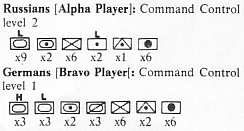
GAME LENGTH: Six Game-Turns.
VICTORY CONDITIONS: The side with the highest number of undisrupted
units, not including vehicles, within three hexes of hex #3315 at the
end of the scenario wins. If both sides have an equal number, the game
is a draw.
SPECLAL RULES: All infantry start the game mounted in vehicles.
HISTORICAL NOTES: After Army Group Center was penetrated by the
Russians, the Germans attempted to employ their mobile units to prevent
the Soviets from surrounding their static forces. At Marina Gorka, the
two forces met and battled for control of a bottleneck area vital to the
passage of both Russian reserves and retreating Axis forces. In the
mobile battle that developed, the experienced Russian tankers defeated
the Germans, helping to seal up 70,000 Germans in the Bobriuysk pocket.
[18.5] SCENARIO Nr. 11, CHIR BRIDGEHEAD, 20 Dec., 1942
TERRAIN MODE: OPEN
FORCES:
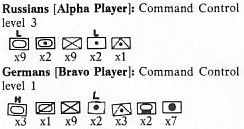
DEPLOYMENT: Russians set up and move first.
Russians (Alpha Player): Deploys on any hexes whose last two numbers are
between "10" and "01" inclusive on eastern half of mapsheet.
Germans (Bravo Player): Deploy on any hexes whose last two numbers are
between "10" and "O1" inclusive on the western half of the mapsheet.
GAME LENGTH: 8 Game-Turns.
VICTORY CONDITIONS: The Russian Player must destroy at least five German
units (excluding vehicles) and have at least one undisrupted unit with a
Line of Cornmunications to the North north edge of the map on or
adjacent to hex #2831 at the end of the scenario. If only one of these
conditions are met, the scenarip is a draw; if neither is met, the
scenario is a German victory.
SPECIAL RULES: All German infantry start start the scenario mounted in
vehicles. All dismounted German infantry in Rough Terrain is considered
to be in Improved Positions.
HISTORICAL NOTES: In the German breakthrough at Stalingrad, the 11th
Panzer Division was used as a mobile reserve and attempted to contain
the Russian breakout from the Chir River bridgehead. The Germans were
spread too thinly, however, and the Russians succeeded in breaking
through. The Soviet forces also defeated the lst Battalion of the 11th
PanzerGrenadier Division which was defending an important crossroads.
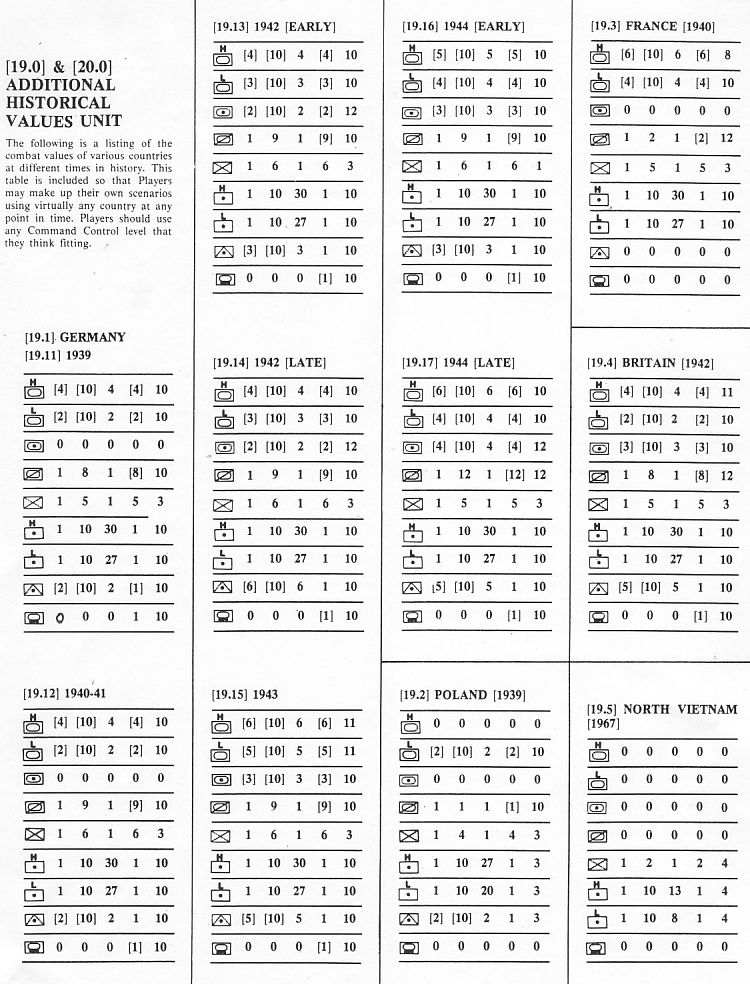
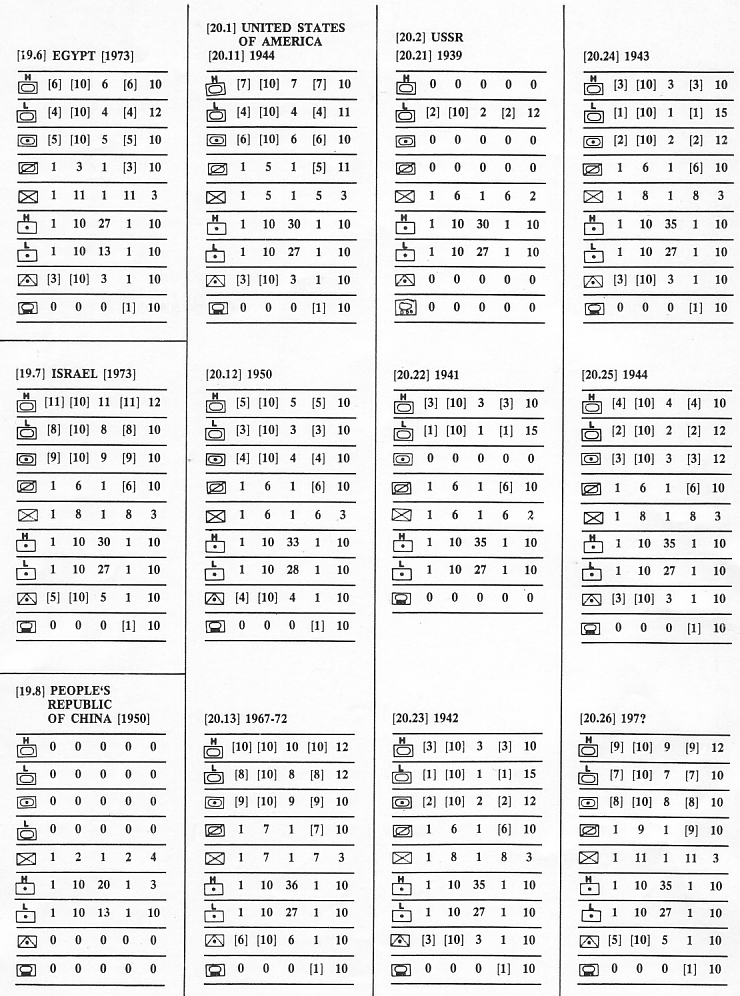
NB submitted by John Kula ([email protected])
on behalf of the Strategy Gaming Society
(http://www.boardgamegeek.com/~sgs),
originally collected by Andrew Webber
([email protected])









